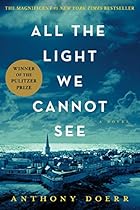Marie-Laure has been blind since the age of six. Her father builds a perfect miniature of their Paris neighbourhood so she can memorize it by touch and navigate her way home. But when the Nazis invade, father and daughter flee with a dangerous secret. Werner is a German orphan, destined to labour in the same mine that claimed his father's life, until he discovers a knack for engineering. His talent wins him a place at a brutal military academy, but his way out of obscurity is built on suffering. At the same time, far away in a walled city by the sea, an old man discovers new worlds without ever setting foot outside his home. But all around him, impending danger closes in. Doerr's combination of soaring imagination and meticulous observation is electric, as Europe is engulfed by war and lives collide unpredictably.
I almost didn't check this out of the library, because I'm almost worn out and almost blasè about war books. However, the premise of this one was a bit different. So I took a chance and am really glad I did, because I almost missed the read of the year. Here is a war story told from the perspective of two young people - almost too young to be directly involved when the war begins. The blind french girl is on the one hand so dependent on others to show her the way -- at least until she memorizes the way on her own; the young German is so determined not to have to go down into the dark, claustrophic bowels of the earth as the miner his father did. He'll do anything to avoid that darkness.
Each is dealing with darkness from a different standpoint: he is trying to avoid darkness, and she is doomed to live within it. Both of them find light and life from music and from sound. She is evacuated to St Malo where she lives with an uncle who, although a recluse, is building and hiding radios. The German boy too, displays an expertise in building and operating radios, and eventually is rescued from having to go to the mines.
Doerr tells their stories, along with several auxiliary plot lines, in alternate chapters from each youth's point of view. The story is easy to follow, the tension builds quickly, and the inexorable march toward the inevitable makes this a true page turner.
In my case, I was able to "read" this book the same way Marie-Laure would have -- with my ears. The audio version, produced by Simon and Schuster, and and narrated by Zach Appelman, really enables the reader to experience life exactly as young Marie-Laure did. The descriptions of how she "saw" things, how she counted her steps, listened for creaking boards, and was able to tune into radio broadcasts was well portrayed, and perfect for the audio format. I am especially thankful that the producers did not attempt to articulate sounds Marie-Laure heard in her head. It was left to the reader's imagination to furnish that sensory experience.
I don't want to give away the ending of the story. It is realistic, beautiful, heart-rending. This is a book worth reading in any format. I intend to read the print version again this fall. I'm really hoping it will appear on the Maine Reader's Choice Long List. It's certainly the best 2014 Fiction I've read so far this year
Title: All the Light We Cannot See
Author: Anthony Doerr
Publisher: Scribner (2014), Edition: First Edition, Hardcover, 544 pages
Audio format: Simon & Schuster Audio, 2014, 13 audio discs (960 min.)
Narrator: Zach Appelman
Genre: Literary Fiction
Subject: blindness; radio transmissions
Setting: Germany; Paris and St. Malo France
Source: public library
Why did I read this book now? It looked interesting.
Saturday, July 26, 2014
2 comments:
Welcome, thanks for stopping by. Now that you've heard our two cents, perhaps you have a few pennies to throw into the discussion. Due to a bunch more anonymous spam getting through, I've had to disallow anonymous comments. I try to respond to all comments posing a question, but may not always get to you right away.
Subscribe to:
Post Comments (Atom)








The WWI and WWII eras are those I have not got tired of reading. Maybe because my country seemed so far removed from the arena of the wars, I like reading not just about the wars and its effect themselves, but also of the various behind the scenes activities like the Resistance, the vigilante groups and of course the romances that went ahead despite all the odds.
ReplyDeleteI heard this was an awesome read. Must try it.
ReplyDelete